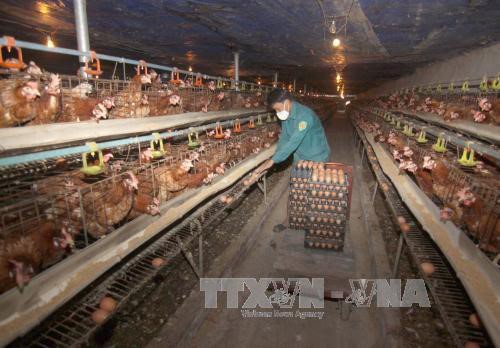(VOVWORLD) - The Vietnamese Party and State have yearned for a fair society where all citizens have the right to contribute and enjoy benefits. Vietnam is now set to narrow the wealth gap to realize the long-term goal of social fairness.

Famers are engaged in animal husbandry to improve their life (Photo: VNA)
|
After 30 years of renewal, 30 million Vietnamese have escaped poverty, according to the General Statistics Office. The poverty rate fell sharply from 58% in 1993 to 14.5% in 2008 and below 5% in 2015. Last year, when Vietnam began measurement of multidimensional poverty, the poverty rate was 4%.
Income gap
A study by Oxfam, an international NGO based in the UK, indicates that the annual income of the 210 richest people in Vietnam could raise 3.2 million people out of poverty. The Gini index, an important tool for analyzing income or wealth distribution in a country or region, shows rising inequality in Vietnam. The northern, central highland and north central regions have the widest income gaps. Bui Cong Khe of the Hanoi Union of Science and Technology Associations said: “Inequality is widespread in health care. The poor still depend on State support because they cannot afford treatment. Extremely poor households without health insurance sometimes have to sell their house to cover health care costs. But the rich can afford high-tech care.”
Social fairness incorporated in economic growth
A rich-poor gap is inevitable in a market economy. But how wide can the gap be and still allow social welfare and stability. The Vietnam Fatherland Front’s “Fund for the Poor” builds houses for the poor, provides them with capital, and helps them access new technology and learn how to operate a business. Truong Thi Ngoc Anh, Vice Chairwoman of the Vietnam Fatherland Front, said: “We have created several target programs. For example, the poverty reduction program for poor districts or the program to build houses for the poor. The Front works with local authorities to provide aid in a systematic and coordinated manner.”
Bui Sy Loi, Vice Chairman of the National Assembly’s Committee on Social Affairs, suggested that the creation of social fairness should be combined with economic growth and social policies. He said growth should ensure quality of life, so that all citizens are able to enjoy achievements of renewal and socialism:“Equal opportunities should be created to resolve employment and income problems. Work conditions should be improved. Redundant famers should receive hiring priority. By performing these tasks, we are eliminating poverty and hunger, boosting growth, and narrowing the rich-poor gap.”
Narrowing the wealth gap and ensuring social fairness creates a foundation for Vietnam’s sustainable development.